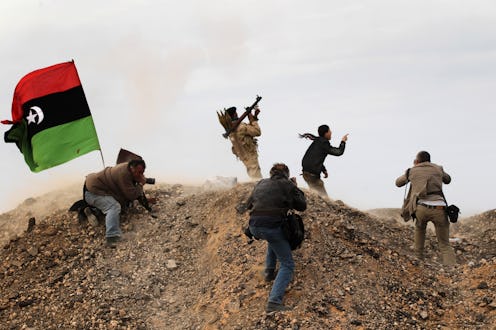News
Kidnapped Journalist Peter Curtis Is Coming Home
Just five days after American journalist James Foley was executed by ISIS, the United States can breathe a sigh of relief as fellow journalist Peter Curtis was freed from Syria after two years in captivity. According to breaking reports, Peter Theo Curtis is now safely with United Nations representatives and out of the custody of his captors.
Curtis first went missing in October 2012 after being captured by the Islamic rebels near the Syria-Turkey. Like many of his colleagues, including Foley, Curtis was abducted while covering the conflict in Syria. The Committee to Protect Journalists believes that nearly two dozen journalists remain in rebel grasps in Syria. To date, it is estimated that 67 journalists have lost their lives in Syria.
Curtis, however, is one of the lucky few who have been released. On Sunday, a family friend confirmed that Curtis was in the company of UN officials. In June, Curtis' captors, the Nusra Front, an Al Qaeda linked organization based in Syria, released a scripted video of the journalist saying that he "had everything" necessary to survive, and that "everything has been perfect, food, clothing, even friends now."
The validity of these statements has been contested, as they seem to stand in stark contrast with the experiences recounted by American photojournalist Matthew Schrier. Schrier, who escaped from the Nusra Front last year, told the New York Times that in his seven months in the prison (the one Curtis also occupied as Schrier's cellmate), he was tortured and starved.
Luckily, Schrier managed to escape by "standing on his cellmate’s back, to unravel some wires in an opening in the wall of their cell." While Schrier could fit through the narrow opening, Curtis was unable to do the same, and convinced his friend to go without him.
13 months later, the two may soon be reunited, both having been liberated from their captors.
It is yet unclear as to what events led up to Curtis' release, especially considering the recent brutality faced by James Foley. A letter received by the Foley family before their son's execution claimed that ISIS had given the American government "many chances to negotiate the release of your people via cash transactions as other governments have accepted."
This was in reference to a letter sent on November 26, 2013, which demanded $132 million as a ransom for Foley's safe return.
Such exchanges are strictly prohibited by both the American and British governments. In fact, US laws make it illegal for anyone, be it an organization or individual, to transfer money to terrorists, which completely eliminates ransoms as a viable option.
This is not to say that Al Qaeda and its associated groups have not managed to round up considerable funds by taking hostages — a New York Times investigation conducted last month suggested that the terrorist groups have raised a frightening $125 million, all from ransoms.
Nearly half that sum, the Times reported, was acquired over the course of 2013 alone. Much of this money comes from European governments — ISIS released 6 European journalists, two from Spain and four from France, after their respective governments agreed to comply with monetary demands.
While Curtis ended up in the custody of the the Nusra Front, it is unclear whether they were the group initially involved in his kidnapping. Prisoners in the region tend to be passed around among groups, and as such, it is often difficult to track their captors' histories and locations.
Though both ISIS and the Nusra Front rely heavily upon kidnappings and their subsequent ransom rewards to fund their activities, the two organizations are not affiliated and split from one another after ISIS left Al Qaeda.
Citing "ideological and tactical differences" as motivation for their separation, the Nusra Front remains tied to central Al Qaeda leadership, which has condemned the much more violent and extremist ISIS leaders for their cruelty.
According to National Security Advisor Susan E. Rice, Curtis is to be "reunited with his family shortly," and is "safe." In a statement, Secretary of State John Kerry said,
Over these last two years, the United States reached out to more than two dozen countries asking for urgent help from anyone who might have tools, influence, or leverage to help secure Theo's release and the release of any Americans held hostage in Syria.
In this particular instance, it seems, the United States' efforts have proven effective.
Now, all eyes are once again on ISIS, who threatened to execute another American journalist, Steven Sotloff, if their demands were not met. But perhaps Curtis' release demonstrates some hope for a similar ending to Sotloff's story.
Images: Getty Images (4)
